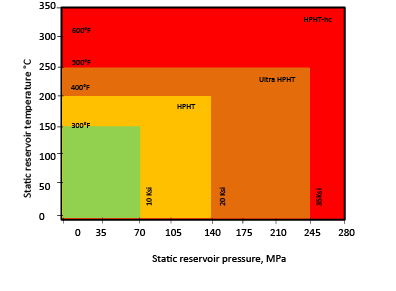What is HPHT? (High Pressure, High Temperature)
October 2017

What is HPHT? (High Pressure, High Temperature)
HPHT or High Pressure, High Temperature is defined as those Wells with a bottom hole temperature greater than 150°C (300°F) and requiring pressure control equipment with a rated working pressure of above 69 MPa (10,000psi) (S.P.E E&P Glossary, HPHT, 2013). Further advances in exploration, extraction and production mean some Wells are reaching higher pressures and temperatures, termed as Ultra HPHT (205°C, 138MPa) and even Extreme HPHT (260°C, 241MPa).

These temperatures and pressures are pushing workable limits of traditional elastomeric and polymeric materials and our material and seal engineers are working with downhole and fluid control component manufacturers to ensure our products continue to meet these challenges along with the typical requirements of resistance to Hydrogen Sulphide (H₂S), age degradation, and the hazard of particulates in the media promoting erosion in the seals.
Fluorocarbon has a wide range of polymers within its portfolio and continues to develop new grades of high-performance polymers, in partnership with raw material suppliers, to create high strength and high-temperature grades of material that retains flexibility and energy when combined with springs in the engineered seal design. These materials allow our engineers to be innovative with solutions that include multi-piece assemblies with sealing and support rings, engineered to use system pressures to enhance seal effect yet prevent material flow through clearances.
.jpg)
As technologies advance, international and national standards are reviewed to keep abreast of the changes. Fluorocarbon works with and influences many regulatory bodies, standards agencies and associations. This ensures continuity in meeting the innovation demands whilst compliance and acceptance criteria are considered and met accordingly.
For further information on HPHT click here
To find out how we can support your projects contact info@fluorocarbon.co.uk










